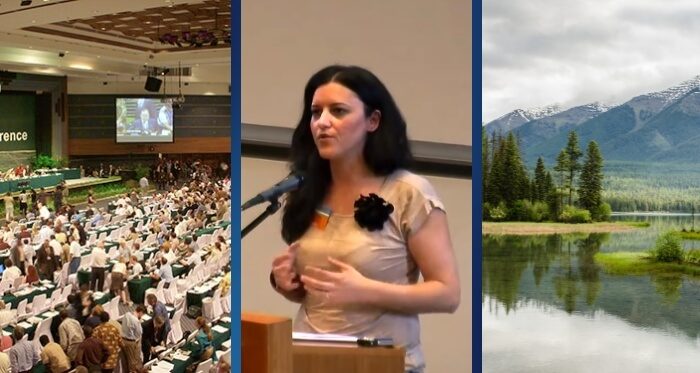Global Warming Conferences are crucial gatherings where experts, activists, and folks like you meet to talk about climate solutions. But with so many happening worldwide, how to find a global warming conference to attend?
To find a global warming conference to attend, search online event platforms, check environmental organizations’ websites, follow relevant social media accounts, and subscribe to climate-related newsletters for updates.
In this guide, we’ll help you find the right climate conference for you. Whether you care about climate change, want to learn more, or connect with others who share your concerns, we’ll show you how. Come along to make a difference, one conference at a time.
The Purpose of a Global Warming Conference
Climate change poses a significant threat to our planet’s future. Global warming conferences bring experts, policymakers, and stakeholders together to address this critical issue. These events foster dialogue, collaborative research, and actionable solutions to curb the rising temperatures.
Worldwide, countries are experiencing the adverse effects of environmental shifts. Collaborative platforms like these conferences are instrumental in bridging knowledge gaps and standardizing global responses. By uniting diverse voices, we ensure that strategies are inclusive and effective for all nations.
Such gatherings, however, are not just about creating policies. They also raise public awareness, energizing communities to act locally while thinking globally. Through education and engagement, these conferences amplify the urgency and propel collective action against climate change.
Types of Global Warming Conferences for Attendees
Global warming conferences come in various formats, each targeting a unique aspect of the issue. Attendees can explore diverse perspectives, engage with experts, and contribute to solutions through these events. Understanding the different types is crucial to maximize their impact.
Scientific Conferences
Researchers and climatologists gather to present the latest findings related to climate change. Prioritizing empirical data, analyses, and advanced methodology, these forums are essential for continually updating the scientific understanding of global warming’s impacts and causes.
Policy-Making Conferences
At these junctures, government officials, international agencies, and decision-makers assemble to draft and discuss regulatory measures. The emphasis is not only on developing policies but also on refining and implementing them in a synchronized manner. Collaborative efforts ensure global actions align with scientific recommendations.
Activism and Advocacy Gatherings
Empowering grassroots movements, activists, and environmental NGOs, these platforms are the heart of civic action. Attendees delve into strategies for mobilizing communities, influencing policies at various levels, and driving local initiatives. Shared experiences and stories amplify the global call to action.
Technology and Innovation Summits
Bright minds and tech-savvy innovators converge to exhibit and discuss technological solutions targeting climate adversities. Topics range from breakthroughs in clean energy solutions to sustainable urban planning and smart agriculture. The collaborative spirit aims to fast-track the widespread adoption of green technologies.
Business and Economics Symposia
Corporate leaders, entrepreneurs, and economists gather to brainstorm sustainable economic strategies. Discussions revolve around green investments, eco-friendly supply chains, sustainable business models, and the broader spectrum of corporate responsibility. Balancing economic growth with ecological responsibility is the core focus.
Public Awareness and Education Seminars
For educators, communicators, and the general public, these sessions emphasize the importance of a well-informed society. Through interactive workshops, presentations, and resources, participants are equipped to simplify and disseminate the complexities of climate science. Creating a knowledgeable populace is paramount to driving collective, informed actions.
How to Find a Global Warming Conference to Attend?
Attending a global warming conference can provide profound insights into the climate crisis, innovative solutions, and collaborative opportunities. However, finding the right one can be a challenge. Here’s an step guide to streamline your search.
Determine Your Focus
Begin by identifying the specific aspects of global warming that interest you. Whether it’s science, policy, technology, or activism, knowing your focus will narrow down suitable events. A clear objective enhances the event’s relevance and benefit to you.
Research Online Platforms
Many dedicated websites list environmental and climate-related events. Sites like Eventbrite, Meetup, or specialized environmental platforms often provide detailed conference schedules. Regularly checking these sites can keep you updated.
Consult Academic Institutions
Universities and research institutions frequently host or promote conferences. Contact relevant departments, like environmental science or public policy, for information. They might have insights into both local and international events.
Join Professional Organizations
Groups like the Intergovernmental Panel on Climate Change (IPCC) or local environmental NGOs often organize or attend conferences. Being a member can grant you access to exclusive events or offer discounts for major conferences.
Utilize Social Media
Follow climate change activists, organizations, and researchers on platforms like Twitter or LinkedIn. They often share or promote upcoming conferences. Engaging with their content might also expose you to lesser-known, impactful events.
Network with Industry Professionals
Reach out to professionals in the environmental sector. Not only can they suggest conferences, but they might also offer insights into which ones provide the most value. Building these connections can also enhance your overall conference experience.
Check Local Community Boards
Local libraries, community centers, or schools may have information on nearby conferences. While these might be smaller in scale, they offer valuable networking opportunities and often focus on region-specific climate issues.
Plan and Register Early
Popular conferences can fill up quickly. Once you’ve settled on an event, register as early as possible. Some conferences also offer early-bird discounts or special rates for students and professionals.
Pros and Cons of Attending Global Warming Conference
Global warming conferences bring together diverse minds to address a pressing issue. Like any gathering, they have their advantages and drawbacks. Let’s explore the benefits and potential pitfalls of attending such events.
Pros:
- Networking Opportunities: Meet and connect with a broad spectrum of professionals, activists, and researchers, paving the way for collaborations and knowledge exchange.
- Access to Latest Research: Gain insights into the newest studies, data, and analyses, ensuring you stay updated on pivotal climate-related findings.
- Skill Development: Many conferences host workshops that train attendees in specific skills, such as effective advocacy, nuanced communication, or advanced research methods.
- Public Awareness: Engage with diverse narratives and firsthand accounts, deepening your comprehension and feeling the urgency of the global climate crisis.
- Collaborative Potential: Discover opportunities to forge partnerships, allowing for the inception of joint projects, research, or awareness campaigns.
- Inspiration and Motivation: Immersing yourself in a hub of like-minded individuals can reignite personal commitment, driving you to undertake meaningful actions.
- Influencing Policy: By participating and voicing concerns, attendees have the chance to sway local, regional, or even global environmental policies and strategies.
Cons:
- Financial Costs: Attending conferences, especially those held internationally, often comes with significant expenses, including registration, travel, accommodation, and other incidental costs.
- Overwhelming Information: With a plethora of sessions, presentations, and discussions, attendees might find it challenging to process and retain all the information.
- Potential Bias: Not all conferences are neutral. Some might have agendas, promoting particular views or being unduly influenced by certain corporate interests.
- Time-Consuming: Preparing for, traveling to, and participating in these events can be time-intensive, potentially conflicting with other professional or personal responsibilities.
- Environmental Footprint: Ironically, traveling, especially by air, to these conferences can exacerbate one’s carbon footprint, somewhat counteracting the event’s eco-conscious ethos.
Tips for Maximizing Your Experience at Global Warming Conference
Conferences on global warming present an endless supply of information and chances for networking. To make the most of such gatherings, a strategy is essential. Here’s a guide to maximizing your experience at these events.
Set Clear Objectives
Before stepping foot into the conference, pinpoint your primary motivations. Are you there primarily for learning, networking, or perhaps to share your own research? Having lucid goals not only streamlines your conference journey but also ensures you remain oriented toward outcomes that matter to you.
Thoroughly Research the Agenda
A comprehensive look at the conference’s schedule ahead of time is invaluable. By identifying crucial sessions, immersive workshops, or influential speakers that resonate with your interests, you’ll be better positioned to extract meaningful content and experiences without feeling lost or overwhelmed.
Engage Actively in Sessions
Being a passive observer might offer some insights, but the real magic happens when you’re actively involved. Pose challenging questions, immerse yourself in group discussions, and always be ready to challenge or expand your understanding. This dynamic involvement can transform a mere session into a profound learning experience.
Network Intentionally
While chance encounters can lead to fruitful connections, purposeful networking is a game-changer. Create a list of individuals or groups you’d like to connect with, those who align with your professional trajectory or research aspirations. In the vast sea of attendees, targeted networking can lead to deeper, more meaningful connections.
Take Detailed Notes
The sheer volume of information presented can be staggering. By meticulously documenting key insights, jotting down contacts, or referencing pivotal studies, you’ll have a treasure trove of data to reflect upon later. These notes act as anchors, ensuring you don’t lose sight of what truly captivated you.
Follow-up Post Conference
The conference’s end doesn’t mean the end of the experience. It’s essential to keep the momentum going. Reconnect with those you met, share reflections with peers, or delve into topics that piqued your interest. This continued engagement not only solidifies your learning but can also open doors to future opportunities.
By approaching these climate-centric gatherings with a well-thought-out strategy, attendees can immerse themselves fully, reaping benefits that extend well beyond the confines of the conference hall.
Bottom Line
The increasing effects of climate change make it vital for us to engage in meaningful conversations about the environment. Global warming conferences serve as perfect platforms for this. They’re not just places to share knowledge; they’re venues for action, collaboration, and networking.
How to Find a Global Warming Conference to Attend? isn’t just a practical question. It represents our desire to be part of the solution, to engage with experts, and to make a difference. These events offer everyone, from experts to enthusiasts, a chance to learn, connect, and be inspired.
By attending the right conferences, we’re not only enriching our understanding but also joining a collective force. It’s a step towards a brighter, more sustainable future, and each of us plays a crucial role.








